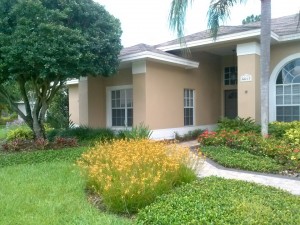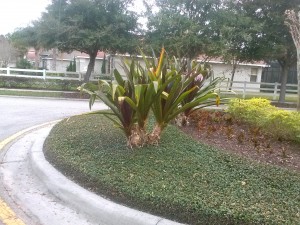
What exactly is a landscape ground-cover? By all that I have ever known in my many years as a landscape designer, it defines any landscape plant that grows under 3' tall. I find that to be a confusing definition, so I am going to discuss a new definition of landscape ground-covers: landscape plants that do truly cover the ground and grow to heights of under 1' tall, more or less.
When I think of ground-cover plants, I think of potential sod substitutes, and I want a plant that will cover the ground! With that concept in mind, there are only a handful of plants that will truly crawl or creep and eventually fill in the bare spots in your landscape. They are:
- Minima Jasmine (also called Dwarf Confederate Jasmine, Asiatic Jasmine): best in full shade or part shade, variegated varieties also available
- Ornamental Peanut, also called Perennial Peanut: full sun only, and not deer resistant
- Mimosa Plant: full sun only
- Blue Pacific Juniper: full sun, part shade, not a true vine runner like the other 3 above
Naturally, there are other plants that will "pup" or multiply, with mature heights of one foot or less, but they will only fill in a small space and cannot be relied upon to cover large areas. With that, while they may "qualify" as a landscape ground-cover, they are unpredictable, at best, in their overall potential performance in the landscape, with regards to cover large areas as a sod substitute. Beyond that, though, they are fabulous landscape plants for any home:
- Bulbine
- Aloe
- Purple Queen and Wandering Jew (those are two different plants, btw)
- Dwarf Oyster
- Mondo and Dwarf Mondo
- Blue Daze, Heather, Kalanchoe
- Sedum
- Fireball Bromeliad
- Dwarf Mexican Petunia
- Portulaca-Rose Moss
Ground-covers, clearly, are an awesome addition to any landscape, no matter what height the plants grow to. However, fabulous landscape designs can only happen when we have a better understanding of what plant should go where, based on it's value to the landscape design. The more we know, the better our landscapes grow, yes?

